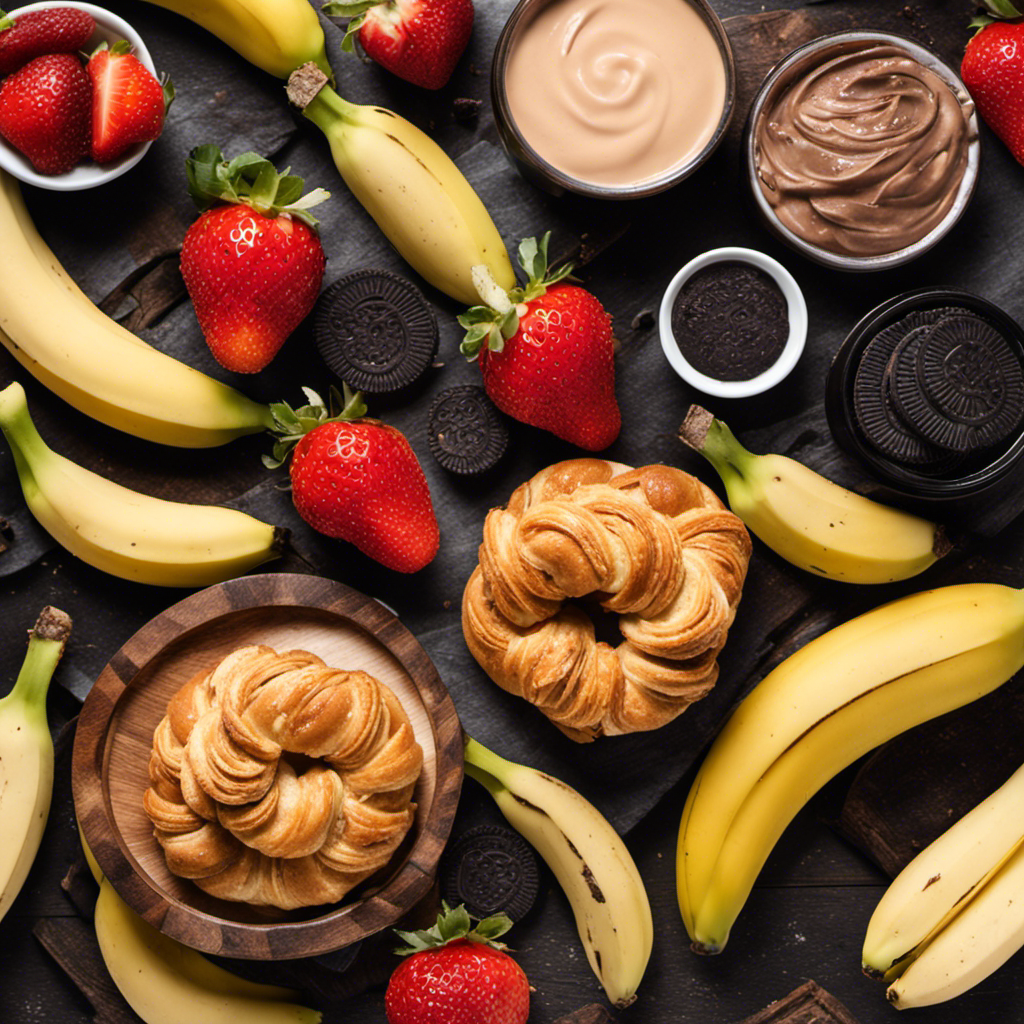Eating butter can be a delicious and nutritious choice for your health. It's packed with vitamins A, D, E, and K, supporting everything from immune function to bone health. The healthy fats in butter can boost metabolism and enhance your gut health, thanks to substances like butyric acid. Incorporating moderate amounts—about 1 to 3 tablespoons daily—can help with weight management without increasing heart disease risk. Plus, it's versatile and adds richness to your meals. As you explore how to enjoy it, you'll uncover even more benefits and creative ways to incorporate butter into your diet.
Key Takeaways
- Butter is rich in essential vitamins A, D, E, and K, supporting overall health and immune function.
- Contains healthy fats like butyric acid that reduce inflammation and promote digestive health.
- Incorporating butter into your diet can aid in weight management and improve metabolic health.
- Opt for organic butter from grass-fed cows for enhanced nutritional benefits and better flavor.
- Use flavored butters to elevate meals and enjoy a variety of taste experiences in your diet.
The Nutritional Profile of Butter

When you look at the nutritional profile of butter, you'll find it packed with essential fats and vitamins. Each tablespoon of butter contains about 102 calories, primarily from its 12 grams of total fat. This includes 7 grams of saturated fat, which plays a significant role in energy storage and hormone production. You'll also get 3 grams of monounsaturated fat and a small amount of polyunsaturated fat, contributing to a balanced fat intake.
Butter isn't just about fats; it also offers a range of vitamins. A tablespoon provides 11% of your daily value for vitamin A, important for vision and immune function. Additionally, it contains smaller amounts of vitamin E and vitamin K, both of which support overall health. The fact that butter is composed of about 80% milk fat underscores its rich fat content. Different types of butter, such as salted and unsalted, can also contribute to varying flavors in your meals. Furthermore, the presence of vitamins A, D, E, and K in butter highlights its nutritional benefits.
While butter does have a bit of cholesterol—31 milligrams per tablespoon—it's worth noting that it also includes short and medium-chain fats, which your body metabolizes differently than long-chain fats. Moreover, the presence of essential fatty acids in butter supports various bodily functions, including hormone regulation and nutrient absorption.
Finally, butter has minimal carbohydrates and no fiber, making it a pure fat source that can fit into various dietary preferences. So, when you choose butter, you're adding a rich nutrient profile to your meals.
Health Benefits of Butter

Butter offers more than just a rich flavor and creamy texture; it also brings a range of health benefits that can enhance your overall well-being. One key component, butyric acid, helps decrease inflammation, especially in the intestines, making it beneficial for those with conditions like Crohn's disease. This compound also nourishes beneficial gut bacteria, promoting digestive health and potentially mitigating issues like irritable bowel syndrome. Additionally, butter's culinary uses extend beyond health benefits, as it adds depth to various dishes, enhancing both flavor and texture. Air purifiers can also be a great addition to your space to improve overall air quality, complementing the health benefits of butter. Furthermore, the rising demand for organic butter products reflects consumers' growing focus on health and sustainability.
Additionally, the conjugated linoleic acid (CLA) in butter boasts anti-inflammatory properties that can bolster your immune function while reducing markers of inflammation. This means you mightn't only feel better but also support your body's defense mechanisms. Furthermore, butter is rich in Vitamin A, which is essential for both thyroid and adrenal health. Research suggests that curcumin absorption can be enhanced with black pepper extract, providing further insights into natural methods for inflammation management.
Butter's healthy fats and medium-chain triglycerides (MCTs) are linked to improved metabolic health, helping regulate energy expenditure and supporting weight management. You may even notice better insulin sensitivity and overall metabolic function.
Moreover, despite its saturated fat content, recent studies suggest that butter may not increase heart disease risk. Instead, it may provide protective benefits for your heart and joints.
Incorporating butter into your diet can be a delicious way to promote wellness while enjoying its rich taste.
Essential Vitamins and Minerals

Often overlooked, butter is a powerhouse of essential vitamins and minerals that can significantly contribute to your health. One of the standout nutrients in butter is vitamin A, providing about 11% of your daily intake per tablespoon. This vitamin supports your vision and immune system. Additionally, incorporating butter into your diet can enhance your skin's hydration and elasticity, similar to the effects of herbal alternatives for Botox-like effects. Adding essential oils for skin can further support skin health and improve overall appearance. Furthermore, using essential oils can provide additional therapeutic benefits when integrated into your wellness routine.
Butter also contains vitamin D, which is crucial for bone health and immune function, and vitamin E, a powerful antioxidant that protects your cells from oxidative stress.
Moreover, butter is a good source of vitamin B12, essential for blood formation and nerve function, and vitamin K2, which helps protect against heart disease and osteoporosis. Additionally, butter is rich in fat-soluble vitamins that enhance its nutritional profile and health benefits.
In terms of minerals, butter includes iodine, calcium, phosphorus, magnesium, and potassium, all playing vital roles in your overall health.
These nutrients work together to support various bodily functions, including thyroid function, muscle and nerve health, and blood pressure regulation. By incorporating butter into your diet, you're not just enjoying a delicious flavor; you're also boosting your intake of essential vitamins and minerals that can enhance your overall well-being.
Butter's Role in Digestive Health

A surprising ally in promoting digestive health, butter provides essential nutrients that support gut function and overall well-being. One of its key components is butyric acid, a short-chain fatty acid that maintains gut barrier integrity, ensuring your gut lining stays healthy and sealed. This acid serves as a crucial fuel source for the cells that line your intestinal walls, offering anti-inflammatory and immune-regulatory benefits. It can even reduce pain during bowel movements. Additionally, butyric acid has shown potential in reducing IBD symptoms, making it a valuable component of a health-conscious diet. Regular consumption of green tea can also complement these effects by supporting overall cognitive function. Furthermore, using a butter infuser can enhance the flavor and health benefits of butter by allowing the incorporation of various herbs.
Butter also impacts your gut microbiota positively. High-fat diets, including those with butter, can induce early changes in your gut flora, which may correlate with important physiological and biochemical parameters. These changes suggest an early implication in the risk of future health issues. Moreover, incorporating cultured butter into your diet can further enhance your gut health due to its probiotics. Additionally, maintaining good oral hygiene and regular dental check-ups can help prevent complications that might affect overall health, including dental problems.
Additionally, butter contains lauric acid, which boasts anti-bacterial and anti-fungal properties. This helps combat harmful bacteria and maintain a balanced gut microbiome, reducing the risk of infections.
With its low lactose content, butter is more tolerable than many other dairy products, making it a versatile addition to your diet. Incorporating organic butter from grass-fed cows can enhance your digestive health when paired with fiber-rich and fermented foods.
Butter and Weight Management

When considering your overall health, weight management is a key aspect that can be influenced by dietary choices, including the use of butter.
While some studies show that butter may lead to weight gain in obese rats, this increase primarily involved lean tissue rather than fat. In contrast, lean rats actually experienced decreased weight gain when consuming butter, benefiting from enhanced fat oxidation during exercise.
Butter contains butyric acid, which can improve hormone resistance and reduce inflammation, both of which are essential for weight management. Additionally, it's rich in medium-chain triglycerides (MCTs) that are rapidly absorbed and can boost your metabolism, promoting satiety and reducing the likelihood of overeating. Weight loss impacts cardiac risk factors, independent of diet type, highlighting the importance of dietary choices in overall health. Interestingly, studies have shown that essential oils can also play a role in supporting overall health, including weight management. Moreover, incorporating healthy fats into your diet can enhance the absorption of fat-soluble vitamins, further supporting your nutritional needs. Interestingly, research suggests that including gold investments in your financial strategy can also provide long-term stability, much like a balanced diet contributes to health. The use of herbal infusion machines can also allow for creative ways to incorporate healthy fats into your meals.
When integrated into a balanced diet, butter can support weight management, especially when combined with approaches like a ketogenic diet or intermittent fasting.
However, moderation is crucial; overconsumption can lead to excessive calorie intake. Tailoring your dietary plan to fit your lifestyle and preferences will help you navigate weight management successfully while enjoying the rich flavor of butter.
Risks of Excess Butter Consumption

Excess butter consumption poses significant health risks that you shouldn't ignore. The high saturated fat content in butter can elevate your LDL (bad) cholesterol levels, increasing your risk of heart disease and stroke. Over time, this can lead to plaque formation in your arteries, causing coronary artery disease and potentially heart attacks. Additionally, the login process utilizes secure methods to protect user information, emphasizing the importance of security in health-related choices. It is essential to consider fiber intake when planning a balanced diet, as it plays a crucial role in overall health. Furthermore, maintaining a high vibrational energy can support your overall health and wellness journey. Regular check-ups can also help detect any cardiovascular issues early, improving your chances of staying healthy.
If you consume too much butter, you might also face atherosclerosis, which raises the likelihood of blood clots and strokes. Moreover, studies show that chronic inflammation can exacerbate these risks and lead to further health complications.
Additionally, relying on butter instead of healthier snacks can result in nutrient deficiencies. A diet rich in butter often lacks essential vitamins and minerals found in fruits and vegetables, leading to an imbalanced diet. This can leave you vulnerable to deficiencies in vitamin B₁, D, E, calcium, magnesium, and potassium. Understanding the importance of regular maintenance in your diet is crucial to avoid such deficiencies.
Moreover, the saturated fats in butter can trigger inflammation in your body, which may contribute to health issues like arthritis and cardiovascular diseases. Chronic inflammation is also linked to an increased risk of developing Alzheimer's disease.
Lastly, if you're lactose intolerant or sensitive to casein, excessive butter consumption can lead to digestive discomfort and allergic reactions. Balancing your diet is crucial for maintaining overall health.
Recommendations for Butter Intake

Moderation is key when it comes to enjoying butter as part of a balanced diet. To keep your saturated fat intake in check, aim for less than 10% of your total daily calories, which translates to about 22 grams for a 2,000-calorie diet. This means you should limit your butter consumption to about 1 to 3 tablespoons per day—optimal is around 1 to 2 tablespoons.
While butter is high in saturated fats that can raise LDL cholesterol, it also contains beneficial nutrients like fat-soluble vitamins A, E, and K2, as well as butyrate, which has anti-inflammatory properties. Additionally, incorporating healthy fats from sources like olive oil or avocados can further enhance your meal's nutritional profile. It's important to ensure that your overall diet includes a good balance of diversified investments in nutrition.
To make healthier choices, consider opting for butter from grass-fed cows for higher levels of conjugated linoleic acid (CLA), known for its potential health benefits.
You can also explore alternatives by substituting butter with healthier oils like olive or avocado oil. If you prefer butter, choose products with minimal ingredients and no trans fats.
Delicious Ways to Enjoy Butter

Butter can be more than just a simple spread; it can elevate your meals with delicious flavors and creativity.
Try making apple-cinnamon butter by mixing dried apples, cinnamon, brown sugar, and unsalted butter. It's perfect on scones or breakfast breads. For a bright twist, whip up orange honey butter with grated orange peel, orange preserves, and honey to enjoy on warm biscuits.
Don't forget about pumpkin spice butter, which combines salted butter, pumpkin puree, and spices for a heavenly topping on pancakes or waffles. Flavored butters can truly enhance the taste and enjoyment of your favorite dishes.
If savory's more your style, garlic herb butter made with minced garlic and parmesan can enhance grilled meats or fish.
For something unique, consider roasted hazelnut butter with lemon zest for breakfast rolls, or blend unsalted butter with mashed banana and spices for a sweet treat on waffles.
Store your flavored butters in logs wrapped in wax paper or airtight containers, allowing the flavors to develop.
These delicious butters can transform ordinary meals into something extraordinary, whether you're enjoying a quiet breakfast or hosting an afternoon tea.
Frequently Asked Questions
Can Butter Be Part of a Ketogenic Diet?
Yes, butter can definitely be part of a ketogenic diet!
It's carb-free and high in fats, making it fit perfectly into your daily macros. Plus, it's rich in essential vitamins and beneficial fatty acids that support your health.
Just remember to use it in moderation, as it's calorie-dense. Choosing high-quality, grass-fed butter can enhance the nutritional benefits, helping you stay on track while enjoying your meals.
Is There a Difference Between Salted and Unsalted Butter?
Yes, there's a difference between salted and unsalted butter.
Salted butter contains added salt, which enhances flavor and helps preserve it, while unsalted butter has no added salt, making it fresher.
In baking, unsalted butter's preferred because it allows for better control over salt levels.
Nutritionally, both types are similar, but unsalted butter offers a sodium-free option, which can be beneficial for certain diets.
Choose based on your cooking or baking needs!
How Does Butter Compare to Margarine in Health?
When comparing butter to margarine, you'll find they each have pros and cons.
Butter contains natural fats and essential vitamins, but it's high in saturated fat, which can raise LDL cholesterol.
Margarine, especially those with low trans fats, often has healthier unsaturated fats but may include additives.
Ultimately, your choice should reflect your health goals and dietary needs. Use either sparingly to maintain a balanced diet.
What Are Some Butter Substitutes for Cooking?
When you're looking for butter substitutes for cooking, you've got several tasty options.
Ghee works well due to its high smoke point, making it great for frying.
Olive oil's mild flavor is perfect for sautéing.
Coconut oil adds versatility, and avocado oil offers healthy fats.
Don't forget about butter sprays for a low-calorie option.
Each substitute can enhance your dishes while catering to dietary preferences, so experiment and find what you love!
Can Butter Be Frozen for Long-Term Storage?
Yes, you can freeze butter for long-term storage!
To do this, keep it in its original packaging or wrap it tightly in foil or plastic. Placing it in a freezer bag adds extra protection.
Cutting it into smaller pieces makes it easier to use later. Unsalted and salted butter can last up to 12 months in the freezer, so you won't have to worry about it going bad anytime soon!
Conclusion
Embracing butter can be a tasty step toward better health when enjoyed in moderation. With its rich nutritional profile and numerous health benefits, you can enhance your meals while nourishing your body. Just remember to balance your intake and consider your overall diet. So go ahead, indulge in some delicious butter recipes, and savor the flavors that not only satisfy your taste buds but also support your well-being. Your journey to thriving starts with every buttery bite!










